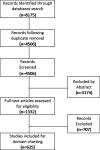The building blocks of community health systems: a systems framework for the design, implementation and evaluation of iCCM programs and community-based interventions
- PMID: 35772810
- PMCID: PMC9247653
- DOI: 10.1136/bmjgh-2022-008493
The building blocks of community health systems: a systems framework for the design, implementation and evaluation of iCCM programs and community-based interventions
Abstract
Introduction: Almost all sub-Saharan African countries have adopted some form of integrated community case management (iCCM) to reduce child mortality, a strategy targeting common childhood diseases in hard-to-reach communities. These programs are complex, maintain diverse implementation typologies and involve many components that can influence the potential success of a program or its ability to effectively perform at scale. While tools and methods exist to support the design and implementation of iCCM and measure its progress, these may not holistically consider some of its key components, which can include program structure, setting context and the interplay between community, human resources, program inputs and health system processes.
Methods: We propose a Global South-driven, systems-based framework that aims to capture these different elements and expand on the fundamental domains of iCCM program implementation. We conducted a content analysis developing a code frame based on iCCM literature, a review of policy documents and discussions with key informants. The framework development was guided by a combination of health systems conceptual frameworks and iCCM indices.
Results: The resulting framework yielded 10 thematic domains comprising 106 categories. These are complemented by a catalogue of critical questions that program designers, implementers and evaluators can ask at various stages of program development to stimulate meaningful discussion and explore the potential implications of implementation in decentralised settings.
Conclusion: The iCCM Systems Framework proposed here aims to complement existing intervention benchmarks and indicators by expanding the scope and depth of the thematic components that comprise it. Its elements can also be adapted for other complex community interventions. While not exhaustive, the framework is intended to highlight the many forces involved in iCCM to help managers better harmonise the organisation and evaluation of their programs and examine their interactions within the larger health system.
Keywords: child health; epidemiology; health policy; health systems; malaria.
© Author(s) (or their employer(s)) 2022. Re-use permitted under CC BY-NC. No commercial re-use. See rights and permissions. Published by BMJ.
Conflict of interest statement
Competing interests: None declared.
Figures



References
Publication types
MeSH terms
LinkOut - more resources
Full Text Sources
